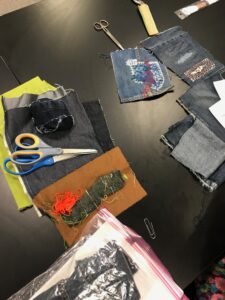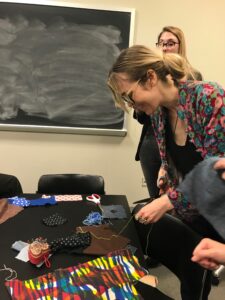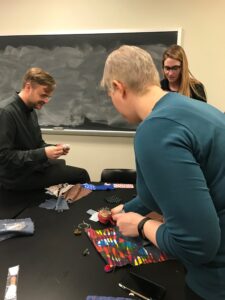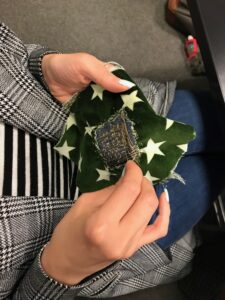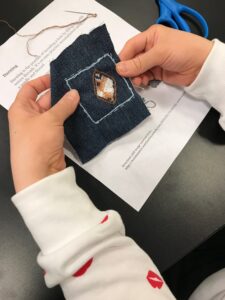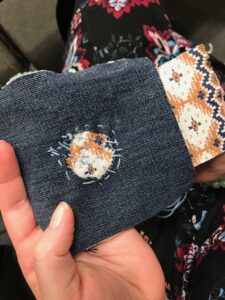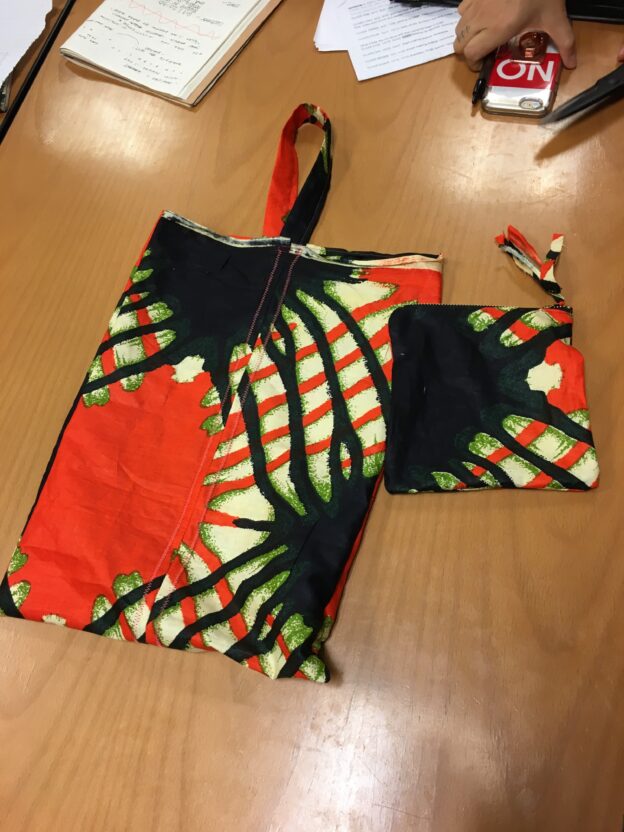A bevy of samples, bits of clothes, scissors and needles covered the desk at the front of the classroom and Professor and crafter Kat Roberts began to speak. Discussing the history of clothing production she ruminated on how fast fashion has alienated people from the care and keeping of clothes. This process happens in a multitude of ways; production wise, fast fashion clothing is not manufactured to last, individually many people have lost the skills associated with tending to worn clothes and culturally, the value of clothing is often constructed around trendiness over longevity or craftsmanship. Roberts discussed the semantic distinction between handmade and mass-produced; while the former brings to mind artisan production, the latter fails to acknowledge the many hands and invisible labor that goes into making all clothing. To contextualize the conversation of our workshop, Roberts mentioned that in actuality, all clothing is handmade. While many of us don’t have the time to make our clothes, taking a moment, in this case a few hours, to mend to our worn items provides a pause to reflect on these labors and our relationship to them as Fashion Scholars participating in the Fabric of Cultures project.
After a brief demo of various stitching techniques, Roberts showed various samples and outlined different techniques for repair, from machine sewing to hand sewing, from patching to sashiko mending. These techniques and their requisite aesthetic can be modified to fit the maker’s desire; low contrast stitching and matching patches for a subtle look, or high contrast and decorative stitching for a more bold one. One of the participants, who works at a high end Italian fashion house, remarked that the swatches reminded him of some of the company’s work, and we briefly discussed high end fashion’s obsession with appropriating the ‘worn look’.
With two participants admitting to limited sewing experience, and another mentioning how “terrible” they were at it, Robert’s simple instruction and handouts provided everyone with the confidence to start stitching. We rummaged through a stack of various denim and printed fabrics (of note was a particular green velvet patterned with stars), threaded our needles and began to make small patches. With our hands busy, the conversation flowed freely, from our current research topics, to the rise of streetwear in Couture, to the performance of gender through dress vis a vis Foucault and Butler. Many people noted how the time simply flew by, and our occupation with small bits of cloth enabled many of us to get to know one another for the first time.
This workshop coincided with Fashion Revolution Week, a week of action to commemorate the Rana Plaza collapse as a part of a larger project to support more transparency in the Fashion Industry. In one their toolkits (downloadable free online), #Haulternative, the Fashion Revolution team suggests getting crafty, and taking the time to repair or alter a beloved item of clothing as a possible action against the endless waste of the Fashion Production system. Our workshop, and the relaxed crafting and conversating certainly felt fitting, and allowed the participants to experience alternatives to traditional academic space, a welcome reprieve and a potent combination for rich conversation.
“Treat your friends like the good clothes they are” Joan Crawford
More resources and info at:
